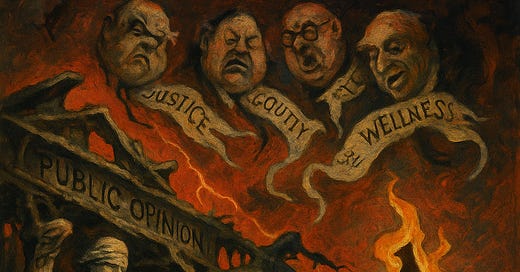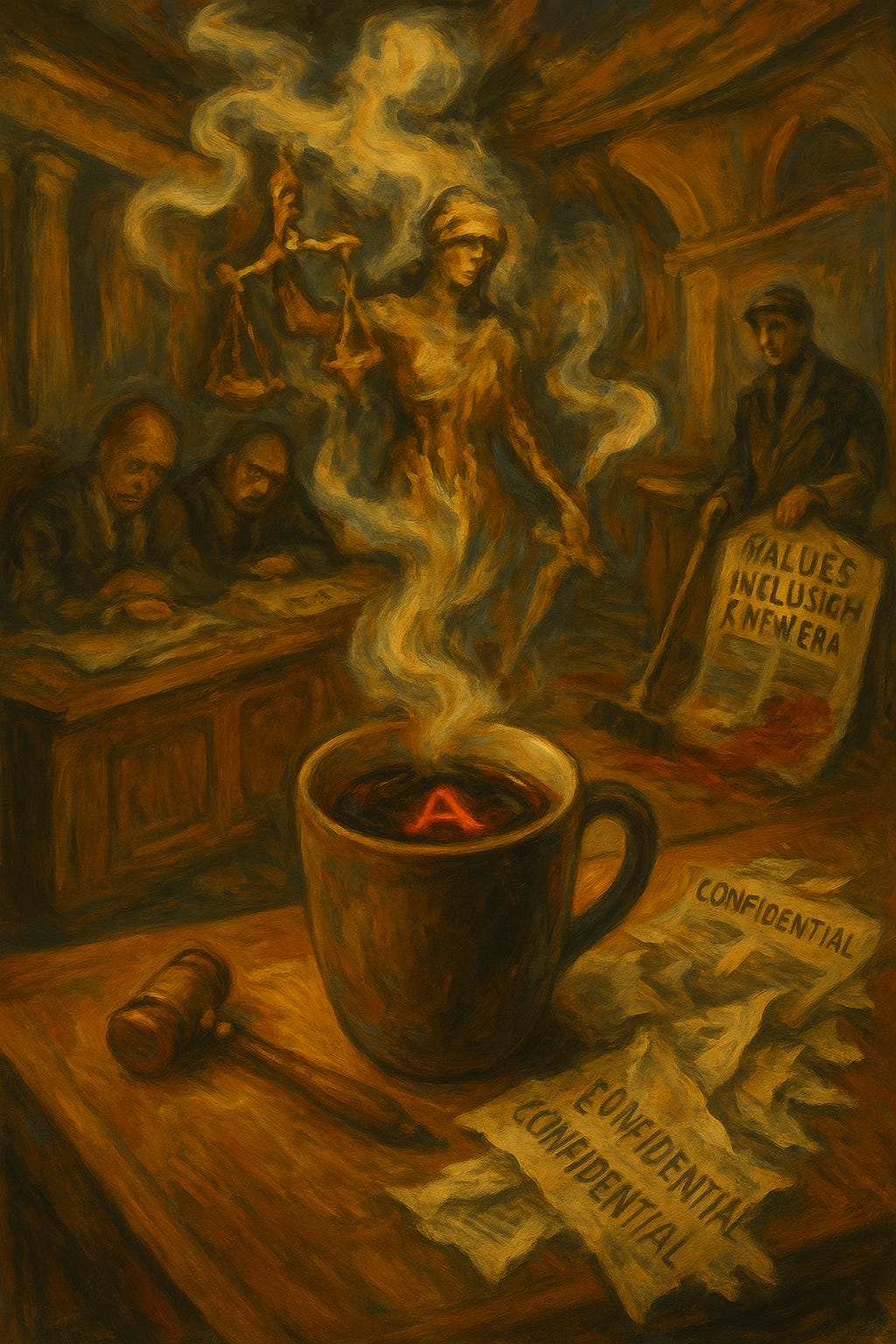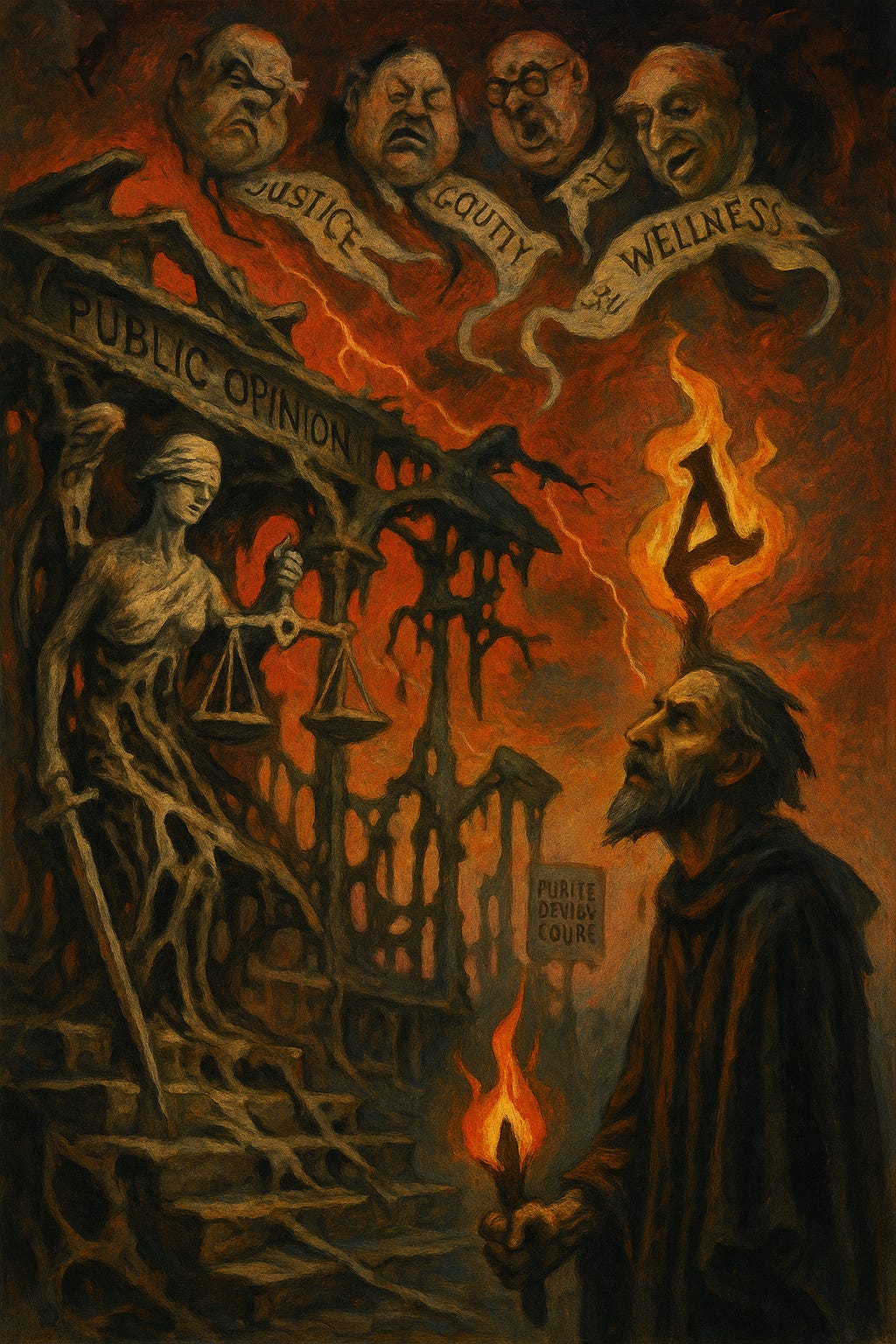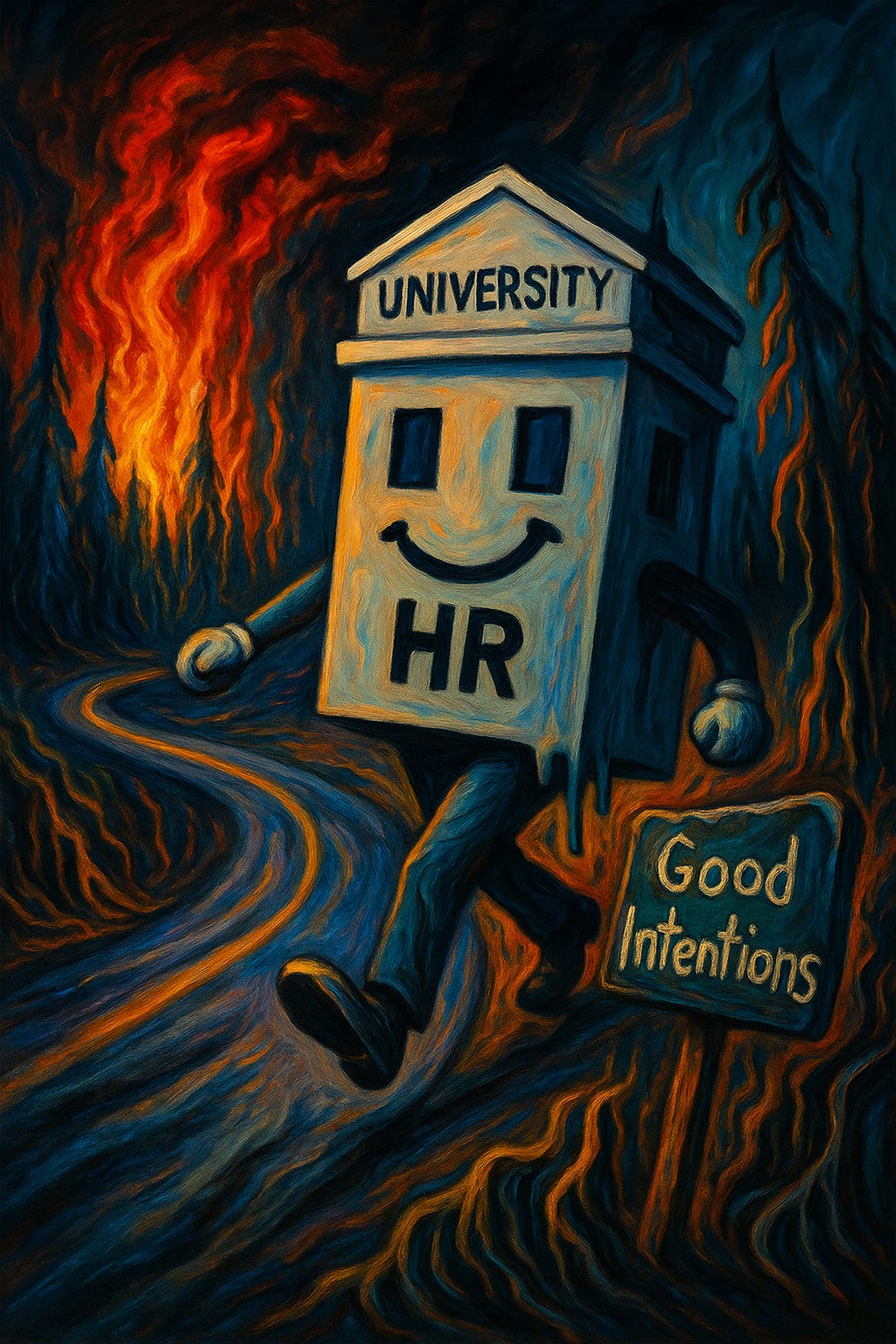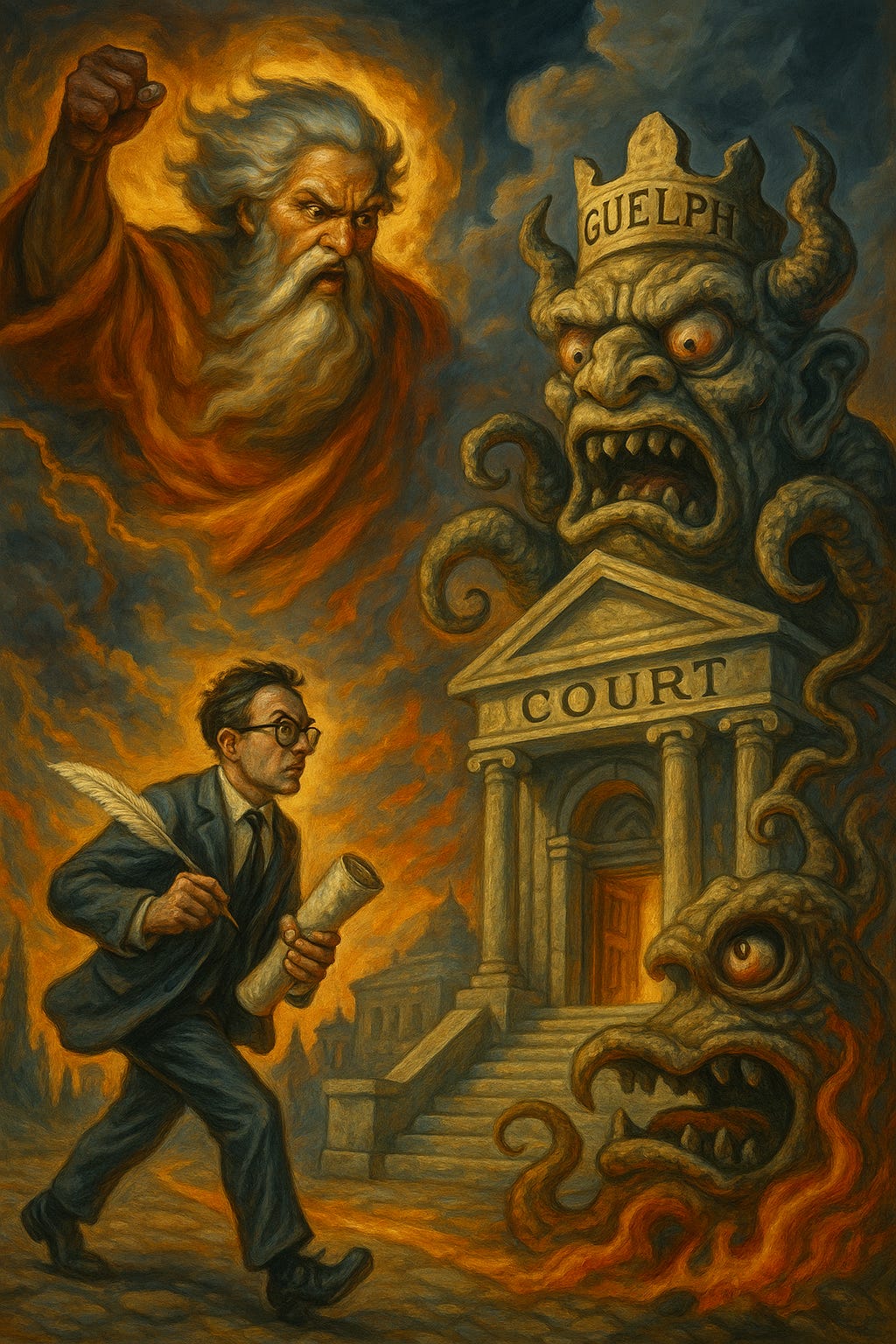Justice Is a Racket: Why Suing Is Often Just Performance Art for the Powerless
Justice Is a Racket: Why Suing Is Often Just Performance Art for the Powerless
If you believe in the importance of free speech, subscribe to support uncensored, fearless writing—the more people who pay, the more time I can devote to this. Free speech matters. I am a university professor who was suspended due to a free speech issue, so I am not speaking from the bleachers. The button below will take you to that story if you'd like.
Please subscribe to receive at least three pieces /essays per week with open comments. It’s $6 per month, or about USD 4. Everyone says, “Hey, it’s just a cup of coffee.” (With me, it's not per day but just one per month.) But if you’re like me, you go, “Hey, I only want so many cups of coffee!” I get it.
But I only ask that when you choose your coffee, please choose mine. Cheers.
“Just sue them.”
The modern rallying cry of the aggrieved. As if justice were a vending machine into which you insert a retainer, punch a button marked Defamation, and wait for Truth to drop, shrink-wrapped and satisfying.
I have a retainer agreement on my desk. The pen sits beside it like a sabre. I could sue my employer. I could sue the student who lied, the staffer who whispered filth into their ear, and the administrator who weaponised the process like a scalpel. I could sue the lot of them—and I just might. But let me disabuse the Netflix generation of the Hollywood fantasy: litigation is not a righteous climax—it is an abyss that eats time, money, health, and often, your soul.
Dozens have advised me of legal hobbyists, the kind who binge courtroom TikToks and cite case law the way drunks recite song lyrics. “Go to the Human Rights Tribunal!” “File a grievance!” “The Labour Board will fix it!” Yes, and I’ll be crowned Miss Canada in the interim.
Here’s the rub: suing in this country—especially as someone accused of the now-canonical blasphemies of being white, male, and insufficiently grovelling—is not a quest for truth. It is a public flogging conducted under fluorescent lights and presided over by clipboard Pharisees.
I. Defamation: The Courtroom as Mirage
Let us start with defamation. You might believe that suing someone for lying about you—maliciously, publicly, professionally—is the most obvious path to vindication. But here’s a tragicomic twist: the law doesn’t care about truth. It cares about proof, publication, harm, and whether what was said can be protected as “fair comment.” In short, if the person calling you a monster believes you’re a monster, and expresses it with just enough uncertainty—“I heard he was seen… doing something…”—they’re immune.
I have ironclad evidence. I have screenshots. I have the lies, the liars, and the documented timeline. But here’s what I also have: PTSD—courtesy of the University of Guelph, Humber College, and their grinning minions of wellness-speak. Suing them would mean living inside that trauma for years, facing down lawyers whose job is not to tell the truth but to ensure no one else can.
And let us not forget the final indignity: even if you win, you may be awarded a sum less than your bar tab at the victory party. Defamation cases in Canada rarely yield substantial damages unless you’re a household name with an actual career to destroy. I am an academic: a suspicious species, to be sure, but one without fans or merchandise.
And meanwhile, the taxpayer foots the bill for the university’s defence—meaning I’ll pay, and so will you, and they’ll call it budgeted risk management.
II. Human Rights Tribunals: Saints for Some, Hell for Others
Ah, the HRTO—Canada’s modern confessional. Except you don’t get forgiveness; you get process. But only if you’re the right kind of person.
Here’s how it works. If you are Indigenous, trans, disabled, or Muslim, you enter the tribunal as a presumed victim. If you are Jewish, male, and over 40, you enter as the suspect. There is no presumption of innocence. The process is the punishment. There is no mechanism in place to punish false complaints. None.
I was accused. I responded. My accuser altered the evidence. They were thanked. I was suspended.
The Human Rights Commission did not inquire, verify, or weigh. They accepted. Automatically. Their role is not to arbitrate. Their role is to affirm. Justice, in this theatre, is a curated narrative sponsored by DEI consultants and enforced by student interns with degrees in gender studies and LinkedIn virtue signalling badges.
Imagine standing before a tribunal where your accuser is paid to be there, and your rights are contingent on your demographic’s historical scorecard. You will lose. And then they will tell you you’ve been heard.
III. The Labour Board: Kafka with a Coffee Machine
Labour boards, for those still clinging to illusions, are not institutions of justice. They are HR laundromats where complaints go to be rinsed, dried, and forgotten. Their role is not to determine guilt or innocence. It is to encourage settlements. “Settlements,” in legalese, means: Shut up and take the cheque.
Assuming you’re lucky enough to get a hearing before retirement age, the best you can hope for is back pay and reinstatement into the very hell that mutilated you. No apology. No change. No accountability.
Imagine walking back into your workplace flanked by those who smeared you, knowing they’re now protected by a doctrine called “reconciliation.” It’s like being handed back your coat after a public beating—bloody, torn, and without your wallet.
IV. Victory Is a Whisper, Not a Roar
Suppose, by divine intercession or a clerical error, you win. The verdict is in. You were defamed, wronged, libelled, and mistreated.
Now what?
There is no standing ovation. No moral vindication. You receive a PDF. Maybe a cheque. Your enemies remain employed. The student who lied graduated. The HR manager gets a promotion for implementing “restorative conflict frameworks.”
And your name? Still tangled in whispers, poisoned on Google, still raised as an eyebrow when your back is turned.
Because in today’s justice system, winning is no longer about right and wrong. It’s about narrative control. And narratives, my friends, are not decided in court—they are forged in emails, Slack channels, and university listservs.
V. The Psychological Toll
Let me be unflinchingly plain: I have PTSD. Medically diagnosed, bureaucratically filed, and existentially inescapable.
A dog barks—just once, sharply—and my body lurches as if I’m walking point on a jungle path in Vietnam, circa 1975, waiting for the tripwire or the whisper of death in the trees. My nerves don’t consult the calendar. They react like I’m still in enemy territory—because in some sense, I am.
I forget things—names, days, whole afternoons swallowed in the fog. I wake drenched, heart slamming, from dreams where I’m once again being interrogated for crimes I didn’t commit, by people who knew I didn’t commit them, but found it politically convenient to pretend otherwise.
And what does the law offer in its infinite wisdom? Re-traumatise yourself, please. Step into this Kafkaesque wood chipper of cross-examinations, affidavits, and $40,000 legal invoices. Do that for two to five years, and maybe—just maybe—we’ll give you a laminated certificate saying you were right all along.
This isn’t recovery. It’s sanctioned torture.
The defamation. The investigation. The betrayal by unions so inert they make Stalin’s show trials look brisk and efficient—none of it is healed by legal process. It doesn’t wash out. It hardens, calcifies, and becomes part of your spine.
And justice? Justice becomes not just elusive, but radioactive. Something you once believed in, like God or integrity, until you opened the curtain and saw the sweating man pulling levers behind a Diversity & Inclusion banner.
VI. The Court of Public Opinion
So what’s left?
The pulpit. The pen. The public.
This essay. This voice. This naked, shameless rage.
Dylan Thomas once wrote, “Do not go gentle into that good night.” And I won’t. I rage not just against the dying of the light, but against the bureaucrats who call it wellness. I rage at the silence of colleagues, the whispering cowardice of unions, and the HR drones whose job is to ensure justice is never more than a formality. I rage at institutions that promote liars and punish truth-tellers. I rage, because if I don’t, I’ll vanish into the file marked Closed.
The Old Testament, that gloriously angry book, reminds us: “No weapon formed against you shall prosper, and every tongue that rises against you in judgment you shall condemn.”
Maybe not in court.
But here. Now. In public. In ink. In fire.
I name the liars. I reject the smears. And I hold the mirror to their faces until they blink.
Because sometimes, the only justice left is not to go quietly.


